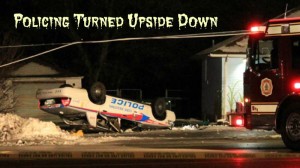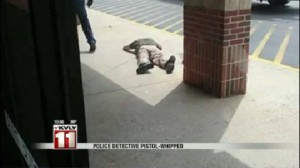
In light of the recent discourse about police use of force across the country, one of the biggest fears that I have is that one of the officers I am privileged to work with will hesitate to use force when it should be used and that failure to use force will result in the injury or death of the officer or another person. I am sure other Police Chiefs across the country share a similar concern.
Recently, a disgusting photo surfaced on social media which showed a Detective with the Birmingham, Alabama Police Department knocked out on the pavement after having been pistol whipped by a suspect after a traffic stop. What made the situation even worse, if it could be worse, was that these photos were posted on social media mocking the officer. I couldn’t help but think about this officer’s family and how those photos affected them, especially since they saw the photos before the department had time to contact them about the incident.
I believe there are some legitimate concerns with police use of force across the country. There have been a number of well publicized failures and many of these have resulted in officers being fired and many being prosecuted. I am confident that the majority of police officers across the country want these officers held accountable and want to only have the very best in our profession doing the very best they can.
Unfortunately, it seems like even when the use of force appears to be legitimate, the police officers involved and the police profession in general is attacked with vigor. This is especially true in cases where the use of force is against an unarmed subject. Each incident should be examined thoroughly and considered on its own merit, rather than in the context of other similar cases in other areas of the country.
The difficult challenge is that once an officer uses force and a subject is either injured or killed, it is impossible to say with absolute certainty what would have happened if the officer had not used deadly force. In the recent incident involving the Birmingham Police Department Detective, we know what happened when he was attacked by an unarmed suspect and didn’t use enough force or even deadly force to stop him. The Detective was brutally attacked and could easily have been killed.
A few days after this incident, other news stories surfaced which described how the suspect aggressively approached the Detective and he failed to act because of his fear of the public repercussions. As a result, he almost lost his life. Check out these news stories below.
http://www.cnn.com/2015/08/13/us/alabama-birmingham-police-detective-pistol-whipped/

One of the worst fears of any police chief came true in Birmingham, Alabama. Luckily, the Detective wasn’t killed and it looks like he will be ok. As a result though, there are serious questions that must be answered.
What can stop unarmed suspects from attacking police officers? How can citizens be protected from officers using deadly force unnecessarily? How can public trust in the police be restored? What can stop the social media attacks on police officers and our profession that inevitably happens when an officer uses deadly force? These are very difficult questions. I don’t have all the answers for sure. If I did, I would shout it from the rooftop. However, here are 7 things we can collectively do right now to move these issues in the right direction.
Policing is one of if not the most honorable professions there is today. However, you wouldn’t think that based on the rhetoric across the country. In order for police officers to be the best they can be, we need to hire the best candidates available. To do this, law enforcement agencies must be pay well, provide exceptional benefits and more importantly, create a work environment that attracts top quality candidates. I realize that is easier said than done.
I know, good training is definitely a challenge. However, it is extremely important and worth the effort. Training has never been more important than it is today in this complicated world. Being a police officer is not easy in the best of times and certainly right now our job is even more difficult. Good training, especially when it comes to using force, both lethal and non-lethal, is important. It is also important that police officers receive Crisis Intervention Training (CIT) to better understand how to handle subjects who are experiencing a mental crisis so they can effectively deescalate the encounter and prevent an unwelcome outcome. Training provides the foundation for doing our job well. When local governments experience financial trouble, the first item that gets cut is typically training. This practice has to change. Training should not be cut.
Again, this sounds easy but because of budgetary constraints, uninformed policies or other factors, many departments are not equipped with the latest technology and equipment that can save lives and protect police officers. Every department should provide their officers a bullet resistant vest and make the wearing of it mandatory. In addition, all officers should be required to wear their seatbelt.
Most departments have in-car cameras and have had them for years but many large agencies still do not provide them for their officers. Today, a Body Worn Camera is almost a necessity for police officers who contact the public, yet many departments still resist this technology, which can provide the best evidence in most use of force incidents. All officers should be equipped with less than lethal equipment such as pepper spray and electronic control devices so they have options other than deadly force.
Modern police departments today best serve their community when they practice the principles of procedural justice. There are four pillars of procedural justice.
Studies have shown that when people believe they are being treated fairly, believe they are not being targeted, have the opportunity to ask questions and tell their side of the story and the department is transparent; they will be more likely to comply with police officers. This is a win, win situation for all concerned.
It takes a great deal of hard work for a police department to have a positive relationship with their community. It is not easy. In fact, it can even be difficult depending on the past relationship issues and concerns. However, the hard work will definitely be worth it. As with any goal, your chances of success increase when you write your goal down and when you act with a purpose.
One great tool available to law enforcement today to help strengthen those relationships with the community is social media. If used correctly, it can supplement other efforts by the department in this area. Social media can be used to demonstrate transparency, build trust and create daily opportunities for positive engagements. Let me be clear; if a department is not conducting itself in an ethical, moral and legal manner, social media will not help.
The job of a police officer is to respond to calls for service for the community they serve and help people in need. Part of being able to help people involves conducting investigations when appropriate and making arrests when warranted. In order to accomplish these tasks with the least amount of risk and danger to the public, the party being contacted by the police must comply with the police officer. This is non-negotiable. In a civilized society, there must be order and to have order, you have to have a public that complies with the police. Otherwise, chaos is the rule of the day and no one is safe.
At this point in time, I think everyone will agree that there are police officers who act inappropriately and must be held accountable. On the other hand, there are officers doing their very best yet mistakes are still made. Even if you add the bad incidents together with the incidents where officers just made a mistake, they pale in comparison to the number of incidents and encounters that are handled appropriately and lawfully each year. We as a society must come to the realization that the majority of police officers are doing an excellent job and should be thanked for the difficult job police officers perform every day. At the same time, public trust can be restored if the officers acting outside the law and their authority are swiftly held accountable. If this happens, then maybe when an incident with a bad outcome occurs there won’t be a condemnation of all law enforcement on social media. Instead, maybe there will be specific questions and concerns about the particular incident in question.
I am not naïve enough to think that the issues facing law enforcement and the eroding of public confidence in the police can be so easily fixed. In reality, nothing could be further from the truth. However, I do believe these are some of the issues, when addressed, which can move the conversation forward to a much better place for everyone.
Have a safe day!
This post was originally published on August 18, 2015 on Chief Grogan’s blog.